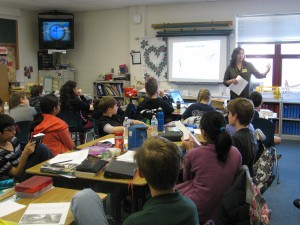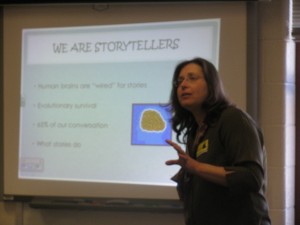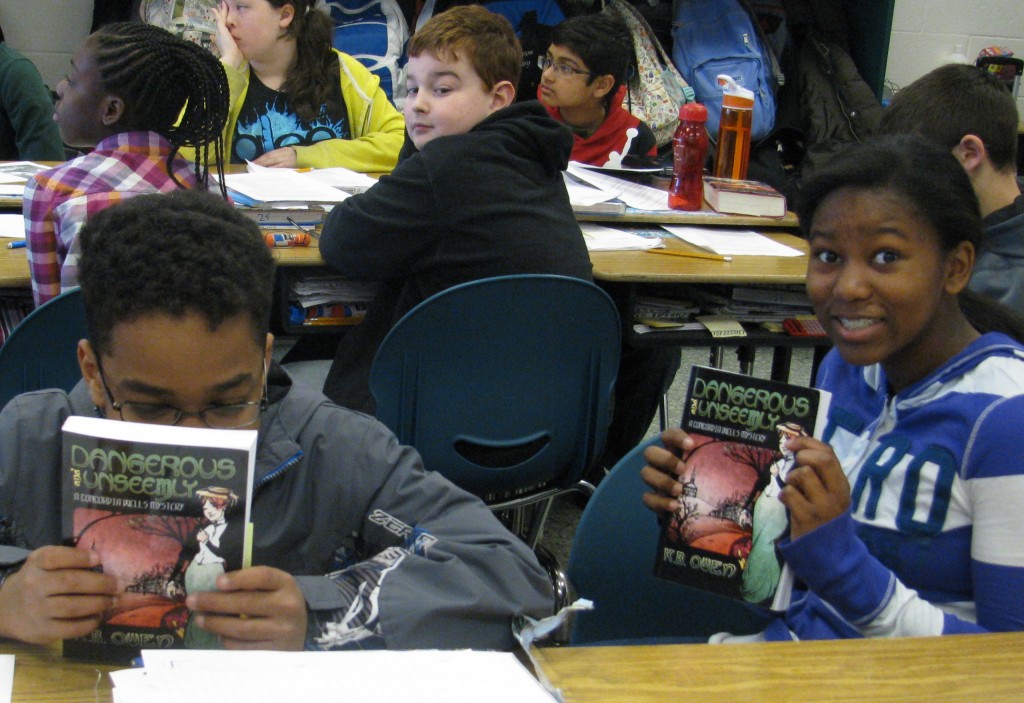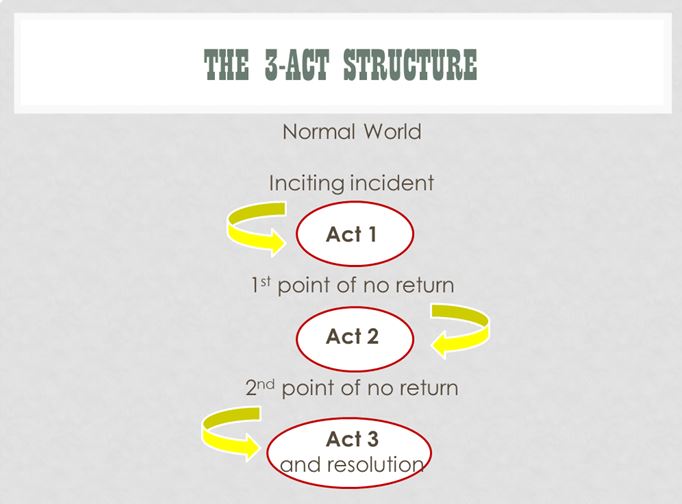Hi, everyone! Yesterday, I had the privilege of giving a talk to two sixth grade classes about writing novels. The Language Arts teacher is just starting a novel-writing unit that’s really cool, where the kids will come out of the process with a 30-50 page novel of their own creation, illustrated, bound and “published.”
 So she asked me to give a little presentation. You know, the Here’s-A-Real-Author-Who-Knows-What-She’s-Talking-About-So-Listen-To-Her kind of talk.
So she asked me to give a little presentation. You know, the Here’s-A-Real-Author-Who-Knows-What-She’s-Talking-About-So-Listen-To-Her kind of talk.
Ahem. Yeah, I was a little nervous, even though I’ve given presentations like this before, and I’m certainly not new to teaching: I’d taught literature at the college level for many years. But there’s something about talking with adolescents as opposed to 18-22 year-olds that can heighten the anxiety level a bit. Especially when your own child is in one of the classes you’ll be talking to. And I’d be speaking to them as an author, not their teacher.
For this year’s talk, I wanted to bring in more of what I’ve been learning as a writer. I put together a new powerpoint slide show (more on that below) and revised, revised, revised.
And it went well! No erasers were thrown, no one was sick…in fact, I got a lot of good questions and participation. So here’s my take-away:
My Top 5 Reasons Why It Rocks to Talk to 6th Graders About Novel-Writing:
1. You get to pass your own novel around…and later, read aloud from it. I’m still buzzing from that.
2. The teacher makes you feel like a rock star. When else do I ever get a mocha latte and a blueberry muffin handed to me? (There was a break between talks – I wasn’t eating in front of the class, LOL). #WillTeachForMuffins
3. Your kid actually looks happy you’re there.
4. When preparing, you have to strip the material down to its essentials. What’s absolutely important to say about writing? What will be the most beneficial? What’s too complex? How can this be organized in a meaningful way? (More on that in a minute). While this was a challenge, it was a wonderfully clarifying process. Doesn’t that often seem to be the case – the teacher learns, along with the students?
5. They applaud when you’re done, and not just because it’s lunch-time, either. 😉
What I considered important to emphasize:
 1. Commonality: all human beings crave stories and tell stories in some form or another, every day. In fact, researchers have found that storytelling makes up 65% of our verbal exchanges.
1. Commonality: all human beings crave stories and tell stories in some form or another, every day. In fact, researchers have found that storytelling makes up 65% of our verbal exchanges.
2. The importance of storytelling: scientists believe it evolved to give humans a survival edge, and now it is our primary way of sharing, persuading, entertaining, and forming the human experience. No matter how digital we get, we look to the story form to get our message across.
3. Ways to get started: the “kernel” idea, “what if” questions, and the logline. We had lots of fun with my “guess the book/movie” logline activity, and we created a logline from a brainstorming session involving videogames and an evil artificial intelligence. Bwahaha.
4. Antagonist, Protagonist, and Power Imbalances: I emphasized the importance of developing your antagonist first, because the story would not exist without the problem; I also talked about the power relationship between the two of them, with the protag being the metaphorical gum at the bottom of the antag’s shoe throughout most of the novel, and then how things turn around so the protag finally has the upper hand and vanquishes the antag. Fun stuff!
5. Structure: I like the 3-Act structure, although I know there are other paradigms out there. I talked from this slide:
6. Suspense: I read a suspenseful scene from my debut mystery, Dangerous and Unseemly, and we analyzed the scene’s strategies for creating suspense, which they can apply in their own writing.
Resources I used:
Wired for Story: the Writer’s Guide to Using Brain Science to Hook Readers from the Very First Sentence (thanks to Rachel Funk Heller for telling me about this book!)
What Listening to a Story Does to Our Brains
Your Brain on Books: 10 Things that Happen to Our Minds When We Read
Blake Snyder’s Save the Cat – really helpful for explaining structure and loglines.
NaNoWriMo’s Young Writer’s Program – this is a fab resource for students and educators. It has cool workbooks and online support for kids from 4th grade through high school.
Have you given an author talk at an elementary school? What would you want to emphasize in giving a book talk? I’d love to hear from you.
Until next time,
Kathy
P.S. – a special thanks to Ms. H, for hosting me! And thank you to all you school teachers out there – I don’t know how you do this extraordinary job, every day. You are amazing. 🙂





This is AWESOME, Kathy!! And think of how many of these children will never, ever forget you.
6th grade seems to be a turning point for writers. It was when I decided, at least. And it’s the age by which you’ve finally read enough books to really start getting the rhythm of it. I’m so glad you had this experience. 🙂 (You’ll never forget it either!)
You’re right, Jenny! I never will forget it. They were a great group of kids, and I hope some of them are able to tap into that inner author.
Thanks for stopping by! 😀
On my phone, it says: “When preparing, you have to strip…”
And then there was a line break.
I was thinking ~ahem~ yes, teens would like that. Except maybe your own. Glad your presentation went well! 😉
LOL, they aren’t teens yet, and I haven’t been thinking about how my posts would look on a mobile device! I’ll have to keep that in mind… 😉
Kathy – What a cool thing you did! And it’s so important for young people to meet with adults who do what they (the kids) want to do. And what’s more, you made the writing process fun and cool rather than drudgery. And for that, you have my highest regard.
Margot, thank you! 😀
Sounds like a great presentation! I teach elementary students, so I see how fun a presentation like that would be. And how great for the kids! What would freak me out is talking to a room full of adults. 🙂 I love the key points of your presentation and I hope you get to present to some more classes.
Thanks, Emma – isn’t that funny what will give one person a case of hives and not another? LOL! 🙂
You are so brave! LOL I think the best part for me would have been that my kid wasn’t hiding under the desk in embarrasment! Looks like you did a fantastic job breaking it down…won’t it be cool if one of them contacts you in a few years and thanks you for inspiring them to follow their writing dream 🙂
Shannon, that would be super-cool! I’ve actually had that experience once or twice at the college level. So rewarding! 😀
How cool! And thank you for sharing your process. I may borrow a few of your ideas if our workshop hosts a writing clinic during the summer for kids. It’s so great that you did this. I’m sure those kids were thrilled to have you. 🙂
Borrow away, Rhonda! I also have the powerpoint and notes if you’re interested in a closer look. Thanks for stopping by! 😉
Wow, wish I’d gotten this presentation in sixth grade. It would have changed my life! I’m sure some budding author with thank you some day. And kudos to the teacher for thinking of it. Way to go, Kathy!
Debra, thanks so much! Let’s hope my sales figures are better by then, LOL. 😉
Like Debra, I wish I’d gotten this presentation in 6th grade. 🙂 Sounds like a fantastic experience for everyone. And someone in that class (maybe more than one) will remember that experience forever because it changed his or her life. Job well done, Kathy!
Who knows? Thanks, Lynette! 😀
Nice Kathy!! Will you be grading their book project also?
Haha, Shannon, no way! I’ll leave that up to Ms. Hartt. 😉 Glad you stopped by for a visit! 😀
Hi Mrs. Owen. i really like your book:)
Hi Mrs. Owen. I really like your book:) Great Job! I can’t wait to read more!!!!
Thanks so much, DANDE! I really appreciate it! 😀
What a wonderful opportunity! I used to volunteer at our middle school’s library, and it was fun to encourage 4th-6th graders to become lifelong readers. I bet it rocked to encourage them to become writers too!